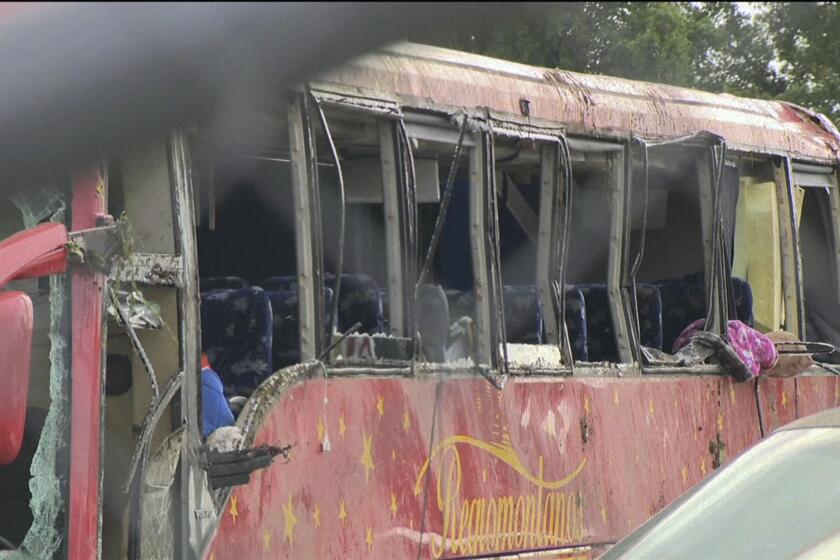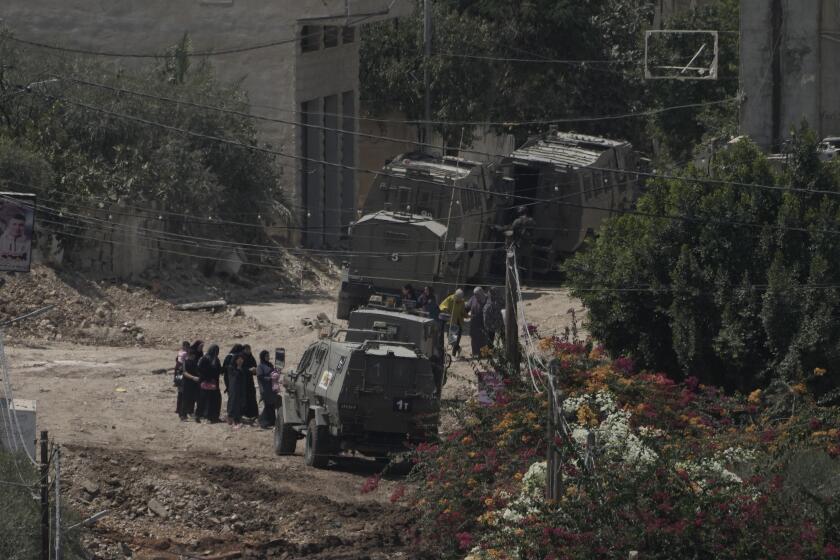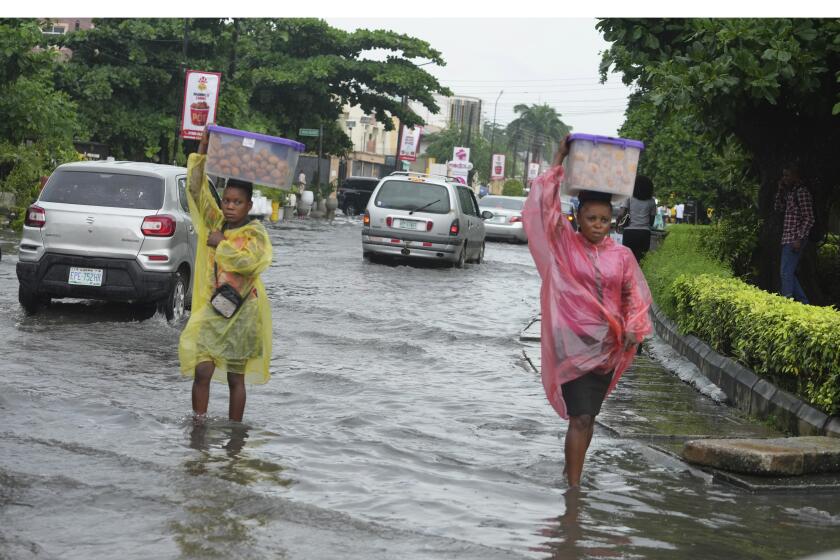Documentary : Khartoum at Crossroads : A visitor unveils Sudan’s mysterious dual nature. By day, this controversial nation is Arabic. By night, it’s African. At any hour, it can be harrowing.
It is impossible to describe the unsettling mixture of tranquillity and bedlam, iridescence and evil, that is at this crossroads of Arabia and Africa. Here, the Blue Nile and White Nile glide into each other, mingle their waters, and roll on toward Egypt.
There is a beguiling character to the soporific stillness of a Khartoum afternoon, when the most prominent motion is the muddy river as it flows in stifling heat under the boughs of flowering acacia trees and still palms.
Khartoum by day is an outpost of Arabia, a cornerstone in the House of Islam where white-turbaned merchants squabble in the morning marketplace, crippled beggars loll in the dusty streets of downtown and the song of the mosque moves on a thick carpet of dust and air across the somnolent afternoon.
Khartoum by night slips into Africa. In the silence after dusk, the throaty sound of drums and chanting rises up in the distance from the banks of the Nile, and Nuba dancers bend and sway toward one another. In a strict Islamic society, in which alcohol is forbidden, flasks of potent aragi, distilled from pressed dates, are passed from hand to hand in the huge camps of displaced blacks from the south who have flooded the Arab north.
I arrived in the silent hours that follow the midnight curfew, imposed after the Islamic fundamentalist regime took power in 1989--the hours when slim teen-age soldiers with Kalashnikov rifles stand wary guard at every major intersection in the city.
I had my eyes open when a friend, armed with a curfew travel permit, picked me up from the airport at 3 a.m. My mission in Sudan was to try to determine the truth of allegations that the Sudanese government was training and supporting Islamic terrorists bent on the downfall of neighboring secular Arab regimes, and rumor had it that it was in the hours after curfew that truckloads of Algerian, Tunisian and Egyptian militants were moved from rest houses in north Khartoum to training camps in the Sudan desert.
We motored slowly from checkpoint to checkpoint, handing over our travel permit for inspection at each stop, until we found ourselves bearing down on a barricade in front of the presidential headquarters.
We heard it before we saw it--two soldiers screaming something at us in a deep-chested roar we didn’t understand until we finally saw them in the glare of our headlights, feet planted, rifles raised and aimed at us, their eyes desperate and frightened.
“Turn off your headlights!” I yelled, the memory of similar nighttime checkpoint encounters in Lebanon, Kuwait, Egypt and Yugoslavia flooding to mind; remembering that wary young soldiers confronted with oncoming headlights may well shoot first and identify the intruders later. But my friend, seemingly paralyzed and confused, didn’t respond. “Turn off your headlights!” I screamed again, reaching across the dashboard, flipping off the lights.
The soldiers strode toward the car, rifles still aimed. We sat motionless until they arrived, grabbed our travel permit, scanned it, scanned us and finally relaxed. “Salaam alayakum (Peace upon you),” I said in Arabic, making a sad attempt at companionability.
“Alaykum salaam (And on you, peace),” they finally replied, and the adventure of the night was over. Off to the hotel. No shootings. No sightings of terrorists--or anyone else, for that matter. A fitful night’s sleep.
The next day, I picked up Al-Sir Sabil, renowned among foreign journalists for his ability to guide his rickety yellow taxi around the streets of Khartoum, up to the doors of secret opposition leaders by night, through the entrances of remote refugee camps by day, outside the watchful eyes of the ubiquitous Sudanese mukhabarat (secret police).
Al-Sir, as much as anyone I met in Khartoum, personified this mix of Arabness and Africanness that is so uniquely Sudanese--that is an essential part of the Sudanese style of laissez-faire Islam.
It is not at all surprising, for example, to stumble late at night upon a rowdy and alcohol-drenched party in the heart of this Islamic fundamentalist capital, only to find police outside fingering their rifles at one moment as if preparing to mount an assault in defense of Islamic principles and irrepressibly tapping their feet the next.
In the souk, you are likely to find Islamic worry beads and Koranic plaques in one stall and black magic charms made of snake parts in the next. The mystic Sufi sect of Islam, reviled by the fundamentalists in Cairo, is at home in Khartoum, its dervishes whirling in front of the camel market on Fridays.
Al-Sir often bemoaned the fact that his skin was too dark to make him an Arab and too light to make him a Negro. He prayed like most Muslims but loved nothing better than a good African-style tribal wedding, complete with dancing. “Men and women together,” he emphasized.
As a journalist’s aide, Al-Sir was unmatched for finesse. He had misstepped only once, landing him and his client from London’s Financial Times in jail for eight days--a time during which he recounts that he told his interrogators the same thing he always does: “I am here to help the journalists. I take them to official places, chosen by the Ministry of Information.” The British ambassador personally intervened to secure his release, he adds.
Al-Sir says his services are expensive ($120 a day) not only because gasoline has to be bought dearly on the black market, not only because he is the only driver who knows everyone a journalist would want to meet, but also because he has been trained as a lawyer and knows how to talk his clients out of tricky situations.
He proved true to his word. While I had an air-conditioned lunch at the Hilton, Al-Sir slogged through the searing afternoon streets and came back breathlessly a few hours later with the news that he had located the family of one of the Sudanese men arrested in New York in connection with a plot to blow up the U.N. building.
“They said they will see you. Your appointment is at 5,” he said, with a smile of conspiracy.
We met with Mahmoud Abdelghani, a well-off merchant and father of one of the young men arrested in the terrorism case, in the courtyard of his home. He served us cold tea made from dried hibiscus flowers and professed himself at a loss as to why anyone would have wanted to arrest his young son, one of 12 siblings, who had gone to New York to work as a taxi driver.
The next few days were a whirlwind of appointments with diplomats, underground opposition spokesmen, government officials, religious leaders. To assess the human rights situation, we tracked down people who had been arrested and tortured by the government. But we were getting nowhere on the terrorism story. Diplomats said there were possibilities, indications, that Sudan was supporting terrorism. But no proof. No terrorist training camps had been sighted.
Sudanese government officials, for their part, said the campaign to link them with terrorism was part of neighboring Egypt’s effort to discredit them in the eyes of the world. Did I see any terrorists running around Khartoum, they wanted to know? Did I see any Iranians, or Tunisians, or Algerians?
Al-Sir picked me up in the morning with a new glint in his eye. He had found the office of the militant Palestinian organization, Islamic Jihad, he said. It was an office that foreign diplomats believed existed but had never seen. We had an appointment there.
When we arrived, Islamic Jihad’s chief in Khartoum was wearing a long, white traditional gown and talking irritably into a telephone. He disappeared when we arrived and appeared 15 minutes later in a neatly tailored gray business suit. As we talked, sweat started pouring down his neck into his collar.
Islamic Jihad is considered by the Israelis, among others, to be responsible for the murders of civilians, including, reportedly, an assault on a busload of Israeli tourists in Egypt a few years ago.
But this man, Abu Abdullah, said Islamic Jihad is engaged in a legitimate military struggle to free Palestinian territory from Israeli occupation. To him, the struggle is for all of that territory--not just the West Bank and Gaza Strip, captured by Israel in the 1967 Middle East War, but places like Tel Aviv and Haifa which have been part of Israel since it became an independent state in 1948.
He doubted that Islamic militants had anything to do with the bombing of the World Trade Center in New York or the plot to blow up the United Nations and other reported targets in New York. But at the same time, he said, America’s policies in the world today--bombing Iraq, bombing Libya, imposing sanctions against Iraq and Libya, attacking Somalia, remaining silent while Muslims are killed in Bosnia--was inviting inevitable Islamic hostility and retribution.
The next day, we set out miles across the Sudan desert, finally obtaining permission to visit one of Sudan’s numerous “jihad” camps--military outposts where volunteers and conscripted university students and civil servants get 45 days of rudimentary military training and religious instruction.
The young officer who greeted us was tight-lipped and a little surly. He clearly didn’t like the idea of having to give an interview and a tour to an unveiled woman.
After a shaky start, we shared a cup of tea inside a breezy tent, and he warmed up. He was pleased that I admitted I saw no Iranian Revolutionary Guards training foreign terrorists at the camp. He seemed surprised that I was interested in where he came from, where he went to school, and how he educates his trainees.
Dozens of young men in white pajama-like uniforms marched in the scorching desert outside. Signs around the parade ground proclaimed: “With Our Hands, We Build Our Country.” “A Nation of Glory, and Glory for It.” And simply, “Allah.”
Here was a uniquely Arab approach to a problem of underdevelopment and hopelessness that has been an African story for years: a dose of Islamic determination and reliance on God to solve problems that cannot be solved.
Indeed, it seemed that these sweating young trainees believed that their desert march-abouts might help the international basket case that is Sudan pull itself out of the mire of hunger, poverty and war in which it struggles.
Some of them talked about how it made them feel proud of their country. Some even had heard figures about how Sudan has actually boosted its agricultural production in the years since it was virtually cut off from foreign help. I didn’t want to tell them that, from the people I talked to, including most of the government’s key leaders, almost nobody thinks Sudan can save itself.
On the dusty drive back to Khartoum, Al-Sir confessed that he--like maybe all of Sudan, though he doesn’t know it--feels trapped between being African and being Arab.
“When the Arabs need us, to support the Palestinian cause, they say you Sudanese are the best of Arabs,” he said. “When they don’t need us, they treat us as slaves. This is our fault, because every government since independence has chased after the Arabs like dogs after meat.
“It is better to be with Africa,” he said. “This is our roots. Africans will never feel they are better than us, or treat us as second-class citizens. But when we go to the Africans, they say, ‘You are Arabs. Go with the Arabs.’ So finally we are with neither. That is why when I have a choice, I always choose to work with the foreigner.”
He dropped me off at the hotel, shook my hand, smiled and waved as he puttered away, the belching smoke of his taxi trailing behind.
More to Read
Sign up for Essential California
The most important California stories and recommendations in your inbox every morning.
You may occasionally receive promotional content from the Los Angeles Times.






